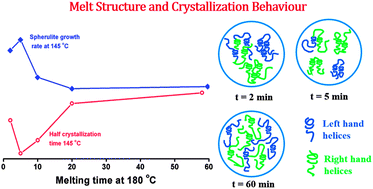Influence of the memory effect of a mesomorphic isotactic polypropylene melt on crystallization behavior
Abstract
In this study, the memory effect of a

* Corresponding authors
a
National Synchrotron Radiation Laboratory, College of Nuclear Science and Technology, University of Science and Technology of China, Hefei, China
E-mail:
lbli@ustc.edu.cn
b Department of Polymer Science and Engineering, CAS Key Lab of Soft Matter Chemistry, University of Science and Technology of China, Hefei, China
In this study, the memory effect of a

 Please wait while we load your content...
Something went wrong. Try again?
Please wait while we load your content...
Something went wrong. Try again?
X. Li, F. Su, Y. Ji, N. Tian, J. Lu, Z. Wang, Z. Qi and L. Li, Soft Matter, 2013, 9, 8579 DOI: 10.1039/C3SM51799C
To request permission to reproduce material from this article, please go to the Copyright Clearance Center request page.
If you are an author contributing to an RSC publication, you do not need to request permission provided correct acknowledgement is given.
If you are the author of this article, you do not need to request permission to reproduce figures and diagrams provided correct acknowledgement is given. If you want to reproduce the whole article in a third-party publication (excluding your thesis/dissertation for which permission is not required) please go to the Copyright Clearance Center request page.
Read more about how to correctly acknowledge RSC content.
 Fetching data from CrossRef.
Fetching data from CrossRef.
This may take some time to load.
Loading related content
